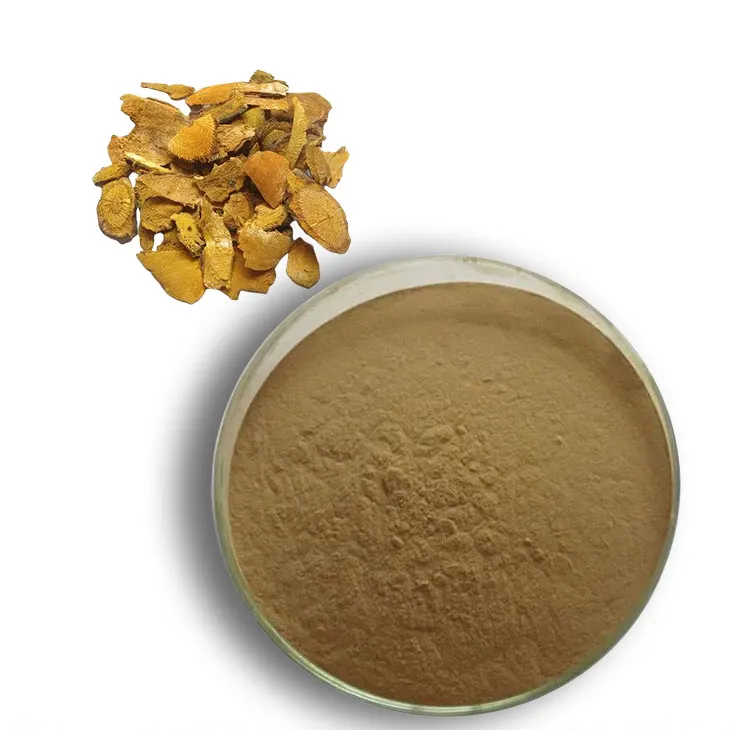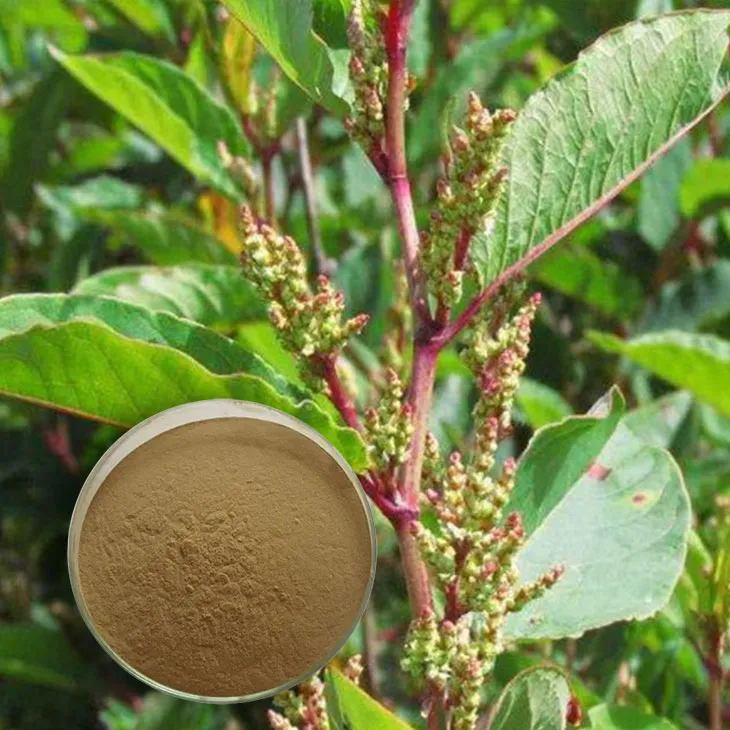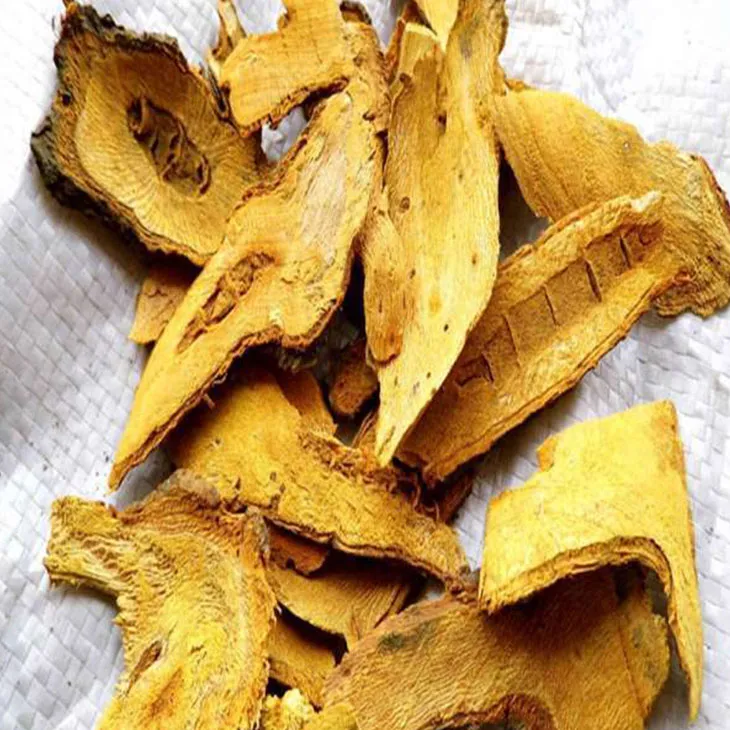- 0086-571-85302990
- sales@greenskybio.com
Polygonum cuspidatum extract: Benefits, uses and possible side effects.
2024-11-11

1. Introduction
Polygonum cuspidatum, also known as Japanese knotweed, has been used in traditional medicine for centuries. Its extract has recently gained significant attention in the scientific community due to its potential health benefits. This article aims to provide a comprehensive overview of the benefits, uses, and possible side effects of Polygonum Cuspidatum Extract.

2. Benefits of Polygonum Cuspidatum Extract
2.1 Antioxidant Properties
One of the most notable benefits of Polygonum Cuspidatum Extract is its antioxidant properties. Antioxidants play a crucial role in maintaining our health by neutralizing free radicals. Free radicals are unstable molecules that can cause damage to cells, leading to various diseases such as cancer, heart disease, and neurodegenerative disorders.
The antioxidants present in Polygonum cuspidatum extract, such as resveratrol, help to scavenge free radicals and prevent oxidative stress. This makes it a potential natural remedy for preventing and managing chronic diseases associated with oxidative damage.
2.2 Anti - inflammatory Effects
Chronic inflammation is a common underlying factor in many diseases. Polygonum cuspidatum extract has been shown to possess anti - inflammatory properties.
Studies have found that certain compounds in the extract can inhibit the production of inflammatory mediators, such as cytokines and prostaglandins. By reducing inflammation, it may help in alleviating symptoms of inflammatory conditions like arthritis, inflammatory bowel disease, and asthma.
2.3 Cardiovascular Health
The extract may also have a positive impact on cardiovascular health.
It has been shown to help lower blood pressure, reduce cholesterol levels, and improve blood vessel function. These effects can contribute to a reduced risk of heart disease, stroke, and other cardiovascular disorders.
- Lowering blood pressure: Some components in the extract may act on the blood vessels, causing them to relax and reducing the resistance to blood flow, thus lowering blood pressure.
- Reducing cholesterol: It may interfere with the absorption or synthesis of cholesterol in the body, leading to a decrease in LDL (bad) cholesterol levels.
- Improving blood vessel function: By promoting the production of nitric oxide, which helps to dilate blood vessels, the extract can enhance blood vessel function.
2.4 Anti - cancer Potential
There is growing evidence suggesting that Polygonum cuspidatum extract may have anti - cancer properties.
In vitro and in vivo studies have demonstrated that certain compounds in the extract can inhibit the growth and proliferation of cancer cells. It may also induce apoptosis (programmed cell death) in cancer cells and prevent the formation of new blood vessels that supply nutrients to tumors (angiogenesis).
However, more research is needed to fully understand its potential as a cancer treatment and whether it can be used in combination with existing cancer therapies.

3. Uses of Polygonum cuspidatum Extract
3.1 Traditional Medicine
In traditional medicine systems, such as Chinese medicine, Polygonum cuspidatum has been used for various purposes.
It has been used to treat conditions like jaundice, liver disorders, menstrual problems, and skin diseases. The traditional uses are often based on empirical knowledge passed down through generations, and modern research is now exploring the scientific basis behind these uses.
3.2 Dietary Supplements
Polygonum cuspidatum extract is increasingly being used as an ingredient in dietary supplements.
Due to its potential health benefits, it is marketed as a supplement for antioxidant support, anti - aging, and general well - being. However, it is important to note that dietary supplements are not regulated in the same way as drugs, and consumers should be cautious when choosing products.
3.3 Cosmetics
The antioxidant and anti - inflammatory properties of Polygonum cuspidatum extract also make it suitable for use in cosmetics.
It can be found in skincare products such as creams, lotions, and serums. It is claimed to help protect the skin from environmental damage, reduce inflammation, and improve skin texture and appearance.

4. Possible Side Effects of Polygonum cuspidatum Extract
4.1 Liver Metabolism
One of the main concerns regarding Polygonum cuspidatum extract is its potential impact on liver metabolism.
Some studies have suggested that certain compounds in the extract may interfere with liver enzymes involved in drug metabolism. This could lead to altered drug levels in the body and potentially increase the risk of drug - related side effects.
For individuals taking medications, especially those metabolized by the liver, it is important to consult a healthcare provider before using Polygonum cuspidatum extract.
4.2 Gastrointestinal Disturbances
There have also been reports of gastrointestinal disturbances associated with the use of Polygonum cuspidatum extract.
These may include symptoms such as nausea, vomiting, diarrhea, and abdominal pain. The exact cause of these side effects is not fully understood, but it may be related to the chemical composition of the extract or individual sensitivities.
4.3 Allergic Reactions
Although rare, allergic reactions to Polygonum cuspidatum extract are possible.
Symptoms of an allergic reaction may include skin rashes, itching, swelling, and difficulty breathing. Individuals with a known allergy to plants in the Polygonaceae family should avoid using products containing the extract.
5. Conclusion
Polygonum cuspidatum extract offers a range of potential benefits, including antioxidant, anti - inflammatory, and effects on cardiovascular health and cancer prevention. It has various uses in traditional medicine, dietary supplements, and cosmetics.
However, it is not without possible side effects, particularly in relation to liver metabolism, gastrointestinal disturbances, and allergic reactions. More research is needed to fully understand its mechanisms of action, safety, and effectiveness.
Before using Polygonum cuspidatum extract, it is advisable to consult a healthcare professional, especially for those with pre - existing medical conditions or those taking medications.
FAQ:
What are the main antioxidant benefits of Polygonum cuspidatum extract?
The antioxidant properties of Polygonum cuspidatum extract are mainly reflected in its ability to combat free radicals. Free radicals can cause oxidative damage to cells in the body, which is associated with many diseases such as cancer, heart disease, and neurodegenerative diseases. The extract contains certain compounds, like resveratrol, which can neutralize free radicals, thus reducing the risk of cell damage and helping in the prevention of these diseases.
How is Polygonum cuspidatum extract used in traditional medicine?
In traditional medicine, Polygonum cuspidatum extract has been used for a variety of purposes. For example, it has been used to treat inflammation - related problems. It may also be used in the treatment of some joint pain and skin diseases. However, these uses are mainly based on traditional experience and knowledge, and more modern scientific research is still needed to fully confirm its effectiveness.
What modern research has been done on the uses of Polygonum cuspidatum extract?
Modern research has explored the potential of Polygonum cuspidatum extract in treating certain chronic diseases. Some studies suggest that it may have a role in managing diabetes by improving insulin sensitivity. It has also been studied for its potential anti - cancer properties, although more research is required to establish its definite efficacy in cancer treatment. Additionally, research has been carried out on its anti - inflammatory and immunomodulatory effects.
What are the possible side effects of Polygonum cuspidatum extract on liver metabolism?
The possible side effects of Polygonum cuspidatum extract on liver metabolism are a concern. Some components in the extract may interfere with liver enzyme activities, which are crucial for normal liver metabolism. This could potentially lead to abnormal liver function tests, such as elevated liver enzyme levels in the blood. However, the extent of these effects can vary depending on factors such as the dosage, duration of use, and individual susceptibility.
How can one ensure the safe use of Polygonum cuspidatum extract?
To ensure the safe use of Polygonum cuspidatum extract, it is important to follow several guidelines. First, consult a healthcare professional before using it, especially if you have pre - existing health conditions or are taking other medications. Second, use products that are from reliable sources and have been properly processed and standardized. Also, adhere to the recommended dosage and usage instructions. Regular medical check - ups, including liver function tests, can also help monitor for any potential adverse effects.
Related literature
- Antioxidant Activity of Polygonum cuspidatum Extract: A Comprehensive Review"
- "Traditional and Modern Medicinal Uses of Polygonum cuspidatum"
- "Side Effects of Herbal Extracts: A Focus on Polygonum cuspidatum"
- ▶ Hesperidin
- ▶ citrus bioflavonoids
- ▶ plant extract
- ▶ lycopene
- ▶ Diosmin
- ▶ Grape seed extract
- ▶ Sea buckthorn Juice Powder
- ▶ Beetroot powder
- ▶ Hops Extract
- ▶ Artichoke Extract
- ▶ Reishi mushroom extract
- ▶ Astaxanthin
- ▶ Green Tea Extract
- ▶ Curcumin Extract
- ▶ Horse Chestnut Extract
- ▶ Other Problems
- ▶ Boswellia Serrata Extract
- ▶ Resveratrol Extract
- ▶ Marigold Extract
- ▶ Grape Leaf Extract
- ▶ blog3
- ▶ Aminolevulinic acid
- ▶ Cranberry Extract
-
Organic Tongkat Ali extract powder factory.
2024-11-11
-
How to make powder with ashwagandha extract.
2024-11-11
-
Rosehip extract manufacturers from China.
2024-11-11
-
The best cat's claw extract in nature.
2024-11-11
-
Chinese Dandelion Leaf Extract Suppliers.
2024-11-11
-
Curcuma Longa Extract
2024-11-11
-
Europen Bilberry Extract
2024-11-11
-
Acai Berry Extract
2024-11-11
-
Citrus Aurantii Extract
2024-11-11
-
Peppermint Oil
2024-11-11
-
Passionflower Extract
2024-11-11
-
Almond Extract Powder
2024-11-11
-
Sea buckthorn Juice Powder
2024-11-11
-
Pomegranate Extract
2024-11-11
-
Shikone Extract
2024-11-11





















